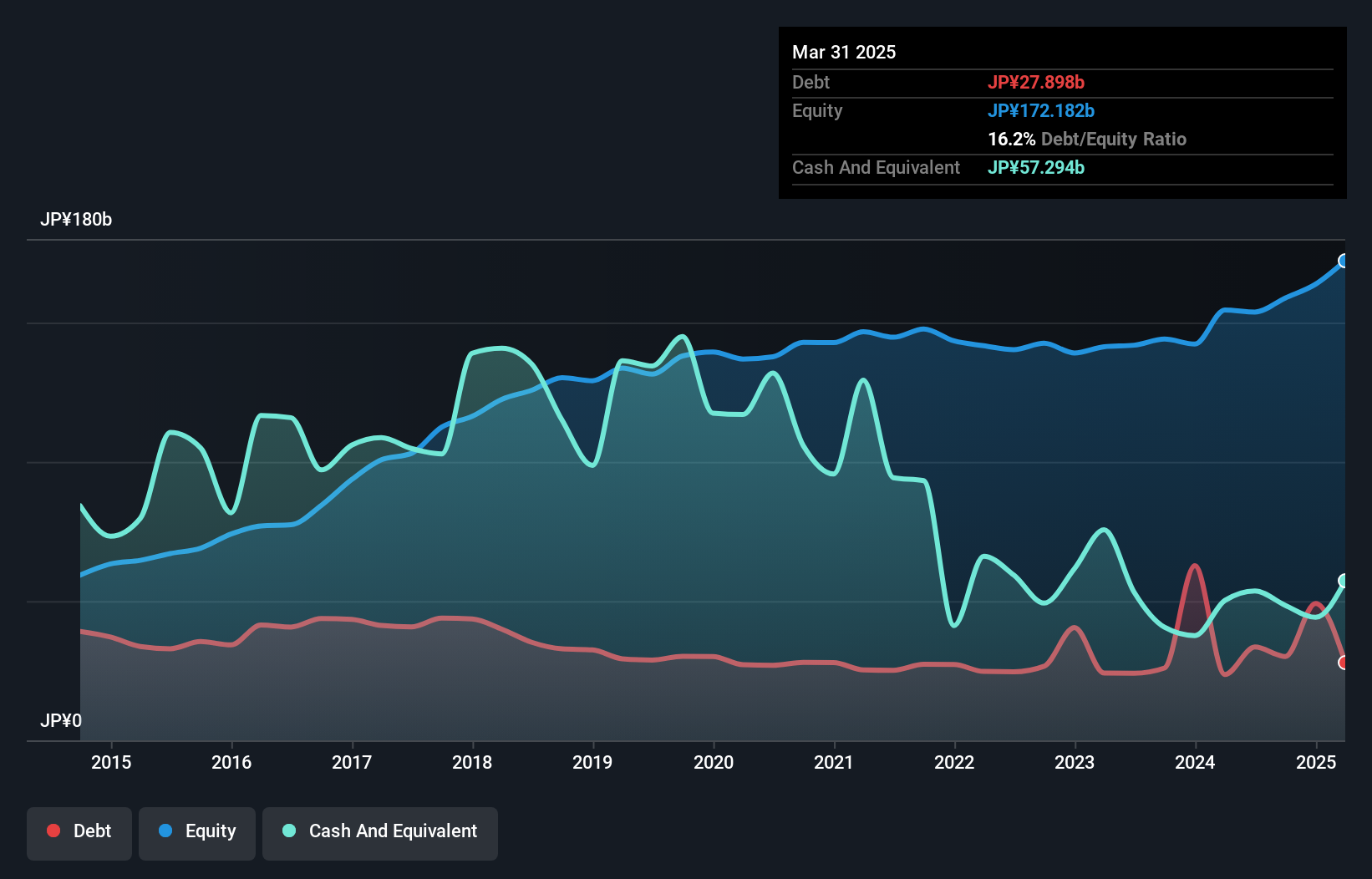Howard Marks put it nicely when he said that, rather than worrying about share price volatility, 'The possibility of permanent loss is the risk I worry about... and every practical investor I know worries about.' When we think about how risky a company is, we always like to look at its use of debt, since debt overload can lead to ruin. We can see that Hazama Ando Corporation (TSE:1719) does use debt in its business. But should shareholders be worried about its use of debt?
When Is Debt Dangerous?
Debt is a tool to help businesses grow, but if a business is incapable of paying off its lenders, then it exists at their mercy. In the worst case scenario, a company can go bankrupt if it cannot pay its creditors. While that is not too common, we often do see indebted companies permanently diluting shareholders because lenders force them to raise capital at a distressed price. Having said that, the most common situation is where a company manages its debt reasonably well - and to its own advantage. When we examine debt levels, we first consider both cash and debt levels, together.
What Is Hazama Ando's Net Debt?
The image below, which you can click on for greater detail, shows that at March 2025 Hazama Ando had debt of JP¥27.9b, up from JP¥23.6b in one year. But it also has JP¥57.3b in cash to offset that, meaning it has JP¥29.4b net cash.

How Healthy Is Hazama Ando's Balance Sheet?
We can see from the most recent balance sheet that Hazama Ando had liabilities of JP¥186.5b falling due within a year, and liabilities of JP¥13.3b due beyond that. On the other hand, it had cash of JP¥57.3b and JP¥213.9b worth of receivables due within a year. So it can boast JP¥71.4b more liquid assets than total liabilities.
This excess liquidity suggests that Hazama Ando is taking a careful approach to debt. Because it has plenty of assets, it is unlikely to have trouble with its lenders. Simply put, the fact that Hazama Ando has more cash than debt is arguably a good indication that it can manage its debt safely.
See our latest analysis for Hazama Ando
In addition to that, we're happy to report that Hazama Ando has boosted its EBIT by 90%, thus reducing the spectre of future debt repayments. The balance sheet is clearly the area to focus on when you are analysing debt. But ultimately the future profitability of the business will decide if Hazama Ando can strengthen its balance sheet over time. So if you're focused on the future you can check out this free report showing analyst profit forecasts.
Finally, a company can only pay off debt with cold hard cash, not accounting profits. While Hazama Ando has net cash on its balance sheet, it's still worth taking a look at its ability to convert earnings before interest and tax (EBIT) to free cash flow, to help us understand how quickly it is building (or eroding) that cash balance. In the last three years, Hazama Ando's free cash flow amounted to 25% of its EBIT, less than we'd expect. That weak cash conversion makes it more difficult to handle indebtedness.
Summing Up
While it is always sensible to investigate a company's debt, in this case Hazama Ando has JP¥29.4b in net cash and a decent-looking balance sheet. And we liked the look of last year's 90% year-on-year EBIT growth. So we don't think Hazama Ando's use of debt is risky. When analysing debt levels, the balance sheet is the obvious place to start. However, not all investment risk resides within the balance sheet - far from it. For example Hazama Ando has 2 warning signs (and 1 which can't be ignored) we think you should know about.
At the end of the day, it's often better to focus on companies that are free from net debt. You can access our special list of such companies (all with a track record of profit growth). It's free.
Valuation is complex, but we're here to simplify it.
Discover if Hazama Ando might be undervalued or overvalued with our detailed analysis, featuring fair value estimates, potential risks, dividends, insider trades, and its financial condition.
Access Free AnalysisHave feedback on this article? Concerned about the content? Get in touch with us directly. Alternatively, email editorial-team (at) simplywallst.com.
This article by Simply Wall St is general in nature. We provide commentary based on historical data and analyst forecasts only using an unbiased methodology and our articles are not intended to be financial advice. It does not constitute a recommendation to buy or sell any stock, and does not take account of your objectives, or your financial situation. We aim to bring you long-term focused analysis driven by fundamental data. Note that our analysis may not factor in the latest price-sensitive company announcements or qualitative material. Simply Wall St has no position in any stocks mentioned.
About TSE:1719
Hazama Ando
Engages in the construction and construction-related business in Japan and internationally.
Flawless balance sheet, undervalued and pays a dividend.
Market Insights
Community Narratives




